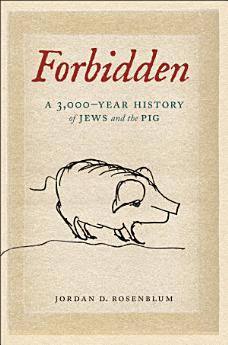Forbidden: A 3,000-Year History of Jews and the Pig
Oct 2024 · NYU Press
Ebook
261
Pages
family_home
Eligible
info
reportRatings and reviews aren’t verified Learn More
About this ebook
Winner of the 74th National Jewish Book Award: The Jane and Stuart Weitzman Family Award for Food Writing and Cookbooks
A surprising history of how the pig has influenced Jewish identity
Jews do not eat pig. This (not always true) observation has been made by both Jews and non-Jews for more than three thousand years and is rooted in biblical law. Though the Torah prohibits eating pig meat, it is not singled out more than other food prohibitions. Horses, rabbits, squirrels, and even vultures, while also not kosher, do not inspire the same level of revulsion for Jews as the pig. The pig has become an iconic symbol for people to signal their Jewishness, non-Jewishness, or rebellion from Judaism. There is nothing in the Bible that suggests Jews are meant to embrace this level of pig-phobia.
Starting with the Hebrew Bible, Jordan D. Rosenblum historicizes the emergence of the pig as a key symbol of Jewish identity, from the Roman persecution of ancient rabbis, to the Spanish Inquisition, when so-called Marranos (“Pigs”) converted to Catholicism, to Shakespeare’s writings, to modern memoirs of those leaving Orthodox Judaism. The pig appears in debates about Jewish emancipation in eighteenth-century England and in vaccine conspiracies; in World War II rallying cries, when many American Jewish soldiers were “eating ham for Uncle Sam;” in conversations about pig sandwiches reportedly consumed by Karl Marx; and in recent deliberations about the kosher status of Impossible Pork.
All told, there is a rich and varied story about the associations of Jews and pigs over time, both emerging from within Judaism and imposed on Jews by others. Expansive yet accessible, Forbidden offers a captivating look into Jewish history and identity through the lens of the pig.
A surprising history of how the pig has influenced Jewish identity
Jews do not eat pig. This (not always true) observation has been made by both Jews and non-Jews for more than three thousand years and is rooted in biblical law. Though the Torah prohibits eating pig meat, it is not singled out more than other food prohibitions. Horses, rabbits, squirrels, and even vultures, while also not kosher, do not inspire the same level of revulsion for Jews as the pig. The pig has become an iconic symbol for people to signal their Jewishness, non-Jewishness, or rebellion from Judaism. There is nothing in the Bible that suggests Jews are meant to embrace this level of pig-phobia.
Starting with the Hebrew Bible, Jordan D. Rosenblum historicizes the emergence of the pig as a key symbol of Jewish identity, from the Roman persecution of ancient rabbis, to the Spanish Inquisition, when so-called Marranos (“Pigs”) converted to Catholicism, to Shakespeare’s writings, to modern memoirs of those leaving Orthodox Judaism. The pig appears in debates about Jewish emancipation in eighteenth-century England and in vaccine conspiracies; in World War II rallying cries, when many American Jewish soldiers were “eating ham for Uncle Sam;” in conversations about pig sandwiches reportedly consumed by Karl Marx; and in recent deliberations about the kosher status of Impossible Pork.
All told, there is a rich and varied story about the associations of Jews and pigs over time, both emerging from within Judaism and imposed on Jews by others. Expansive yet accessible, Forbidden offers a captivating look into Jewish history and identity through the lens of the pig.
About the author
Jordan Rosenblum is Professor of Religious Studies, University of Wisconsin-Madison, where he is also the Belzer Professor of Classical Judaism at the Mosse/Weinstein Center for Jewish Studies. He is the author of many books, including Rabbinic Drinking: What Beverages Teach Us About Rabbinic Literature,
The Jewish Dietary Laws in the Ancient World and Food and Identity in Early Rabbinic Judaism and coeditor of Feasting and Fasting: The History and Ethics of Jewish Food.
Rate this ebook
Tell us what you think.
Reading information
Smartphones and tablets
Install the Google Play Books app for Android and iPad/iPhone. It syncs automatically with your account and allows you to read online or offline wherever you are.
Laptops and computers
You can listen to audiobooks purchased on Google Play using your computer's web browser.
eReaders and other devices
To read on e-ink devices like Kobo eReaders, you'll need to download a file and transfer it to your device. Follow the detailed Help Center instructions to transfer the files to supported eReaders.






